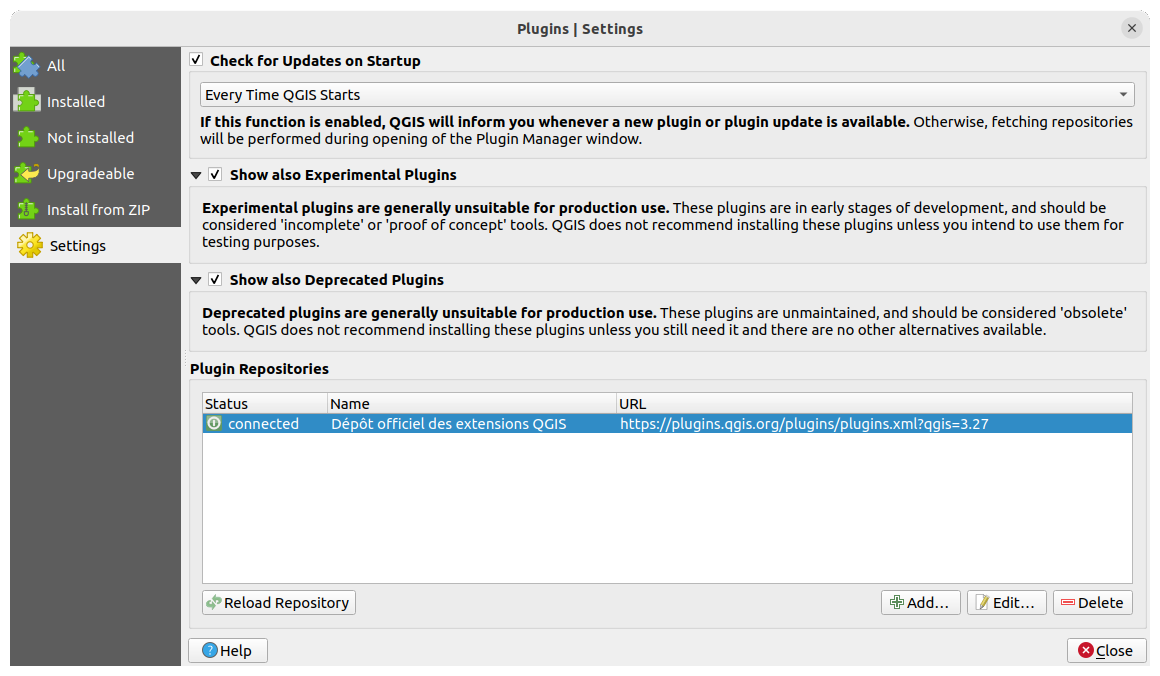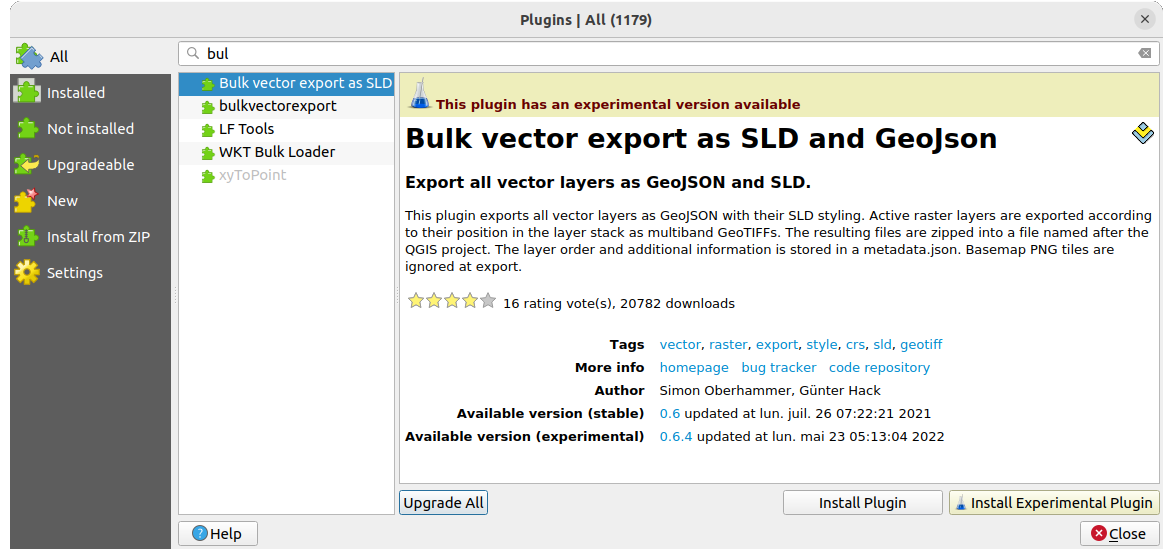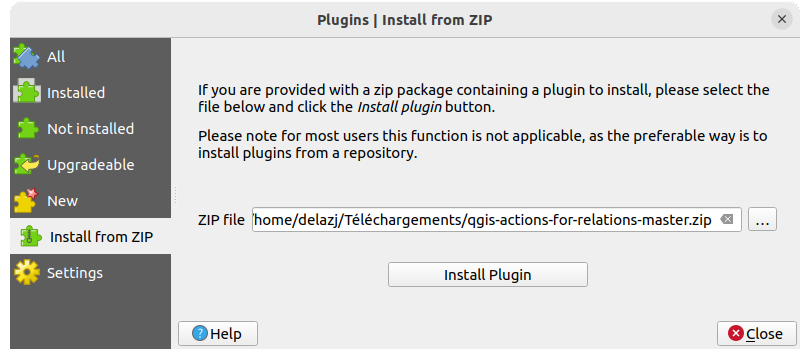28.1. QGIS 플러그인
QGIS는 플러그인 아키텍처로 설계됐습니다. 즉 응용 프로그램에 새로운 여러 기능 및 함수들을 쉽게 추가할 수 있다는 의미입니다. QGIS에서 일부 기능들은 실제로 플러그인으로 실행되고 있습니다.
28.1.1. 핵심 및 외부 플러그인
QGIS 플러그인은 핵심 플러그인 또는 외부 플러그인 둘 중 하나로 실행됩니다.
핵심 플러그인 은 QGIS 개발팀이 관리하며, 모든 QGIS 배포판에 자동적으로 포함됩니다. 핵심 플러그인은 C++ 또는 파이썬 두 언어 가운데 하나로 작성됩니다.
외부 플러그인 대부분은 현재 파이썬으로 작성됩니다. 외부 플러그인은 ‘공식’ QGIS 저장소 https://plugins.qgis.org/plugins/ 에 저장되거나 또는 개인 작성자들이 관리하는 외부 저장소에 저장됩니다. 공식 저장소는 플러그인 사용법, 최저 QGIS 버전, 홈페이지, 작성자 및 기타 중요 정보에 대한 상세 문서를 제공합니다. 기타 외부 저장소의 경우, 외부 플러그인 자체에 문서가 포함돼 있을 수도 있습니다. QGIS 사용자 지침서는 외부 플러그인 문서를 포함하고 있지 않습니다.
플러그인을 설치하거나 활성화하려면, 메뉴에서  항목을 클릭해서 플러그인 관리자 대화창을 여십시오. 외부 파이썬 플러그인은 활성화된 사용자 프로파일 경로의
항목을 클릭해서 플러그인 관리자 대화창을 여십시오. 외부 파이썬 플러그인은 활성화된 사용자 프로파일 경로의 python/plugins 폴더 아래 설치됩니다.
메뉴를 통해 사용자 지정 C++ 플러그인 라이브러리를 가리키는 경로를 추가할 수 있습니다.
28.1.2. 플러그인 대화창
28.1.2.1. 설정 탭
사용자는 왼쪽 패널 하단에 있는  Settings 탭에서 사용자 응용 프로그램에 어떤 플러그인을 표시할 수 있는지 환경 설정할 수 있습니다. 다음 옵션들을 사용할 수 있습니다:
Settings 탭에서 사용자 응용 프로그램에 어떤 플러그인을 표시할 수 있는지 환경 설정할 수 있습니다. 다음 옵션들을 사용할 수 있습니다:
 Check for Updates on Startup: 설치한 플러그인에 업데이트를 사용할 수 있을 때마다, QGIS가 사용자에게 알려줄 것입니다. QGIS를 시작할 때마다, 하루에 한 번, 사흘에 한 번, 1주일에 한 번, 2주일에 한 번, 1달에 한 번 알려주도록 선택할 수 있습니다.
Check for Updates on Startup: 설치한 플러그인에 업데이트를 사용할 수 있을 때마다, QGIS가 사용자에게 알려줄 것입니다. QGIS를 시작할 때마다, 하루에 한 번, 사흘에 한 번, 1주일에 한 번, 2주일에 한 번, 1달에 한 번 알려주도록 선택할 수 있습니다. Show also Experimental Plugins: QGIS가 일반적으로 작업 활용에 부적합한, 개발 초반에 있는 플러그인을 표시할 것입니다. 이런 플러그인의 경우 안정 버전 또는 실험적 버전 가운데 하나를 설치할 수 있고, 어느 때든 두 버전 간에 전환할 수 있습니다.
Show also Experimental Plugins: QGIS가 일반적으로 작업 활용에 부적합한, 개발 초반에 있는 플러그인을 표시할 것입니다. 이런 플러그인의 경우 안정 버전 또는 실험적 버전 가운데 하나를 설치할 수 있고, 어느 때든 두 버전 간에 전환할 수 있습니다. Show also Deprecated Plugins: QGIS에 대체 기능이 있기 때문에, 유지/관리가 안 되고 있기 때문에, 더 이상 QGIS에서 사용할 수 없는 기능에 의존하고 있기 때문에 등등의 이유로 보통 유지/관리되고 있지 않은 플러그인을 표시합니다. 이런 플러그인은 일반적으로 작업 활용에 부적합하므로 플러그인 목록에 회색으로 나타납니다.
Show also Deprecated Plugins: QGIS에 대체 기능이 있기 때문에, 유지/관리가 안 되고 있기 때문에, 더 이상 QGIS에서 사용할 수 없는 기능에 의존하고 있기 때문에 등등의 이유로 보통 유지/관리되고 있지 않은 플러그인을 표시합니다. 이런 플러그인은 일반적으로 작업 활용에 부적합하므로 플러그인 목록에 회색으로 나타납니다.
QGIS는 기본적으로 Plugin Repositories 부분에 https://plugins.qgis.org/plugins/plugins.xml?qgis=version 이라는 URL을 가진 공식 플러그인 저장소를 제공합니다. (이때 <version> 은 사용자가 실행 중인 QGIS의 정확한 버전을 나타냅니다.) 외부 작성자 저장소를 추가하려면,  Add… 버튼을 클릭하고 Repository Details 양식에 이름과 URL을 입력하십시오. 이때 URL은
Add… 버튼을 클릭하고 Repository Details 양식에 이름과 URL을 입력하십시오. 이때 URL은 http:// 또는 file:// 프로토콜 유형일 수 있습니다.
기본 QGIS 저장소는 공개 저장소로 접근하는 데 어떤 인증도 필요하지 않습니다. 하지만 사용자가 자신의 플러그인 저장소를 열어서 인증을 (기본 인증, PKI 등을) 요구할 수는 있습니다. 인증 장에서 QGIS가 지원하는 인증 방법에 대한 자세한 정보를 얻을 수 있습니다.
추가한 저장소 가운데 하나 이상을 더 이상 원하지 않을 경우, 설정 탭에서  Edit… 버튼으로 비활성화시키거나 또는
Edit… 버튼으로 비활성화시키거나 또는  Delete 버튼으로 완전히 삭제할 수 있습니다.
Delete 버튼으로 완전히 삭제할 수 있습니다.

그림 28.1  Settings 탭
Settings 탭
28.1.2.2. 플러그인 탐색하기
탭
Plugins 대화창 위쪽에 있는 탭들은 플러그인의 설치, 생성, 또는 업데이트 상태를 바탕으로 하는 플러그인 목록을 제공합니다. 플러그인의 설정에 따라 다음 탭들을 사용할 수 있습니다:
 Installed: 사용자가 설치한 플러그인과 사용자가 설치 해제할 수 없는, 기본적으로 설치된 핵심 플러그인을 둘 다 표시합니다.
Installed: 사용자가 설치한 플러그인과 사용자가 설치 해제할 수 없는, 기본적으로 설치된 핵심 플러그인을 둘 다 표시합니다. New: 마지막으로 확인한 (Check for Updates on Startup) 이후 배포된 플러그인을 표시합니다.
New: 마지막으로 확인한 (Check for Updates on Startup) 이후 배포된 플러그인을 표시합니다. Invalid: 설치된 플러그인 가운데 (의존성 누락, 불러오는 도중 오류 발생, QGIS 버전과 호환되지 않는 기능 등등) 어떤 이유로든 현재 작동하지 않는 플러그인을 모두 표시합니다.
Invalid: 설치된 플러그인 가운데 (의존성 누락, 불러오는 도중 오류 발생, QGIS 버전과 호환되지 않는 기능 등등) 어떤 이유로든 현재 작동하지 않는 플러그인을 모두 표시합니다.
이 탭들의 최상단에 있는 Search 기능을 통해 (작성자, 이름, 설명, 태그 등등의) 메타데이터 정보를 이용해서 어떤 플러그인이든 찾을 수 있습니다.

그림 28.2  All 탭에서 플러그인 검색하기
All 탭에서 플러그인 검색하기
플러그인
플러그인을 선택하면 오른쪽 패널에 몇몇 메타데이터가 표시될 것입니다:
(Show also Experimental Plugins 옵션을 체크한 경우) 플러그인이 실험적 버전인지 또는 실험적 버전을 사용할 수 있는지에 대한 정보
요약 및 설명
평점 (사용자가 선호하는 플러그인을 평가할 수 있습니다!)
태그
홈페이지, 트래커 및 코드 저장소를 가리키는 유용한 몇몇 링크
작성자(들)
저장소의 다운로드 페이지를 가리키는 링크를 가진, 사용할 수 있는 버전(들) 또는 설치된 플러그인의 로컬 폴더를 가리키는 경로
Plugin Manager 대화창에서 플러그인의 최신 버전을 쌍방향으로 작업할 수 있습니다. 실험적 버전 사용을 활성화한 경우, 실험적 버전이 최신 안정 버전보다 더 최신인 경우에만 표시될 것입니다. 어떤 탭이 활성화되어 있는지 그리고 선택한 플러그인이 설치되어 있는지에 따라, 다음 옵션들 가운데 일부를 선택할 수 있게 될 것입니다:
Install: 선택한 플러그인의 최신 안정 버전을 설치합니다.
Install Experimental Plugin: 선택한 플러그인의 실험적 버전을 설치합니다.
Reinstall Plugin: 예를 들어 어떤 플러그인의 불러오기가 실패한 경우, 해당 플러그인과 동일한 안정 버전을 설치합니다.
Reinstall Experimental Plugin: 예를 들어 어떤 플러그인의 불러오기가 실패한 경우, 해당 플러그인과 동일한 실험적 버전을 설치합니다.
Upgrade Plugin: 선택한 플러그인을 최신 안정 버전으로 업그레이드합니다.
Upgrade Experimental Plugin: 선택한 플러그인을 최신 실험적 버전으로 업그레이드합니다.
Upgrade All: 설치된 모든 플러그인을 (이전에 설치된 플러그인이 안정 버전인지 실험적 버전인지에 따라) 최신 안정 버전 또는 실험적 버전으로 업그레이드합니다.
Downgrade Plugin: 실험적 버전의 플러그인을 이전 안정 버전으로 다운그레이드합니다.
Downgrade Experimental Plugin: 실험적 버전의 플러그인을 가장 마지막으로 게시된 실험적 버전으로 다운그레이드합니다. 아직 게시되지 않은 버전을 테스트하는 경우 이 옵션이 필요할 수 있습니다.
Uninstall Plugin: 사용자 프로파일에서 설치된 플러그인을 제거합니다.
설치된 플러그인 왼쪽에는  체크박스가 표시됩니다. 이 체크박스를 체크 해제하면 플러그인이 일시적으로 비활성화됩니다.
체크박스가 표시됩니다. 이 체크박스를 체크 해제하면 플러그인이 일시적으로 비활성화됩니다.
목록에 있는 플러그인을 오른쪽 클릭하면 플러그인 목록을 다양한 메타데이터를 기준으로 정렬시킬 수 있습니다. 새로 정렬된 순서는 모든 탭에 적용됩니다. 다음과 같은 정렬 옵션을 선택할 수 있습니다:
Sort by Name: 이름으로 정렬
Sort by Downloads: 다운로드로 정렬
Sort by Vote: 평점으로 정렬
Sort by Status: 설치 및 업그레이드 상태로 정렬
Sort by Date Created: 생성 날짜로 정렬
Sort by Date Updated: 업데이트 날짜로 정렬
28.1.2.3. ZIP 탭에서 설치하기
 Install from ZIP 탭은 ZIP으로 압축된 포맷에서 플러그인을 가져올 수 있는, 예를 들어 저장소에서 플러그인을 직접 다운로드할 수 있는 파일 선택기 위젯을 제공합니다. 암호화 파일을 지원합니다.
Install from ZIP 탭은 ZIP으로 압축된 포맷에서 플러그인을 가져올 수 있는, 예를 들어 저장소에서 플러그인을 직접 다운로드할 수 있는 파일 선택기 위젯을 제공합니다. 암호화 파일을 지원합니다.

그림 28.3  Install from zip 탭
Install from zip 탭

